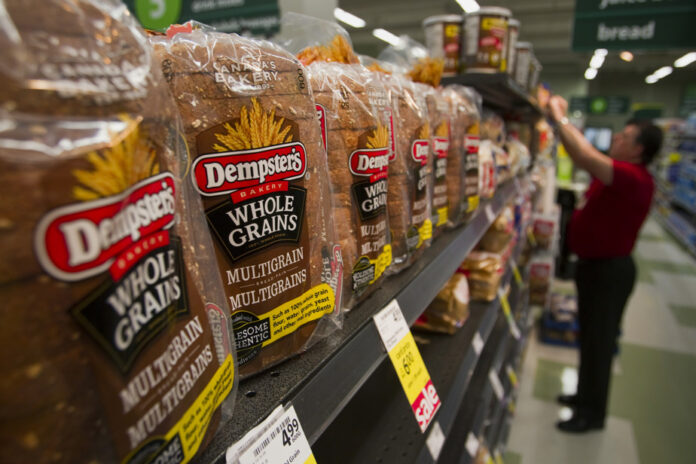Baked goods maker Canada Bread, which admitted to price-fixing earlier this year, says in new court filings that any anticompetitive behavior it participated in was at the behest and benefit of its then-majority owner , Maple Leaf Foods.
In a statement of defense in a class-action lawsuit alleging a bread price-fixing scheme, Canada Bread denied participating in a “long-term and extensive conspiracy” to fix the price of bread. She also denied profiting from the alleged conspiracy or price increases she pleaded guilty to participating in as part of the Competition Bureau’s investigation.
“To the extent that Canada Bread benefited from actionable anti-competitive conduct, all material benefits accrued to Maple Leaf,” the company said in its statement of claim filed in Ontario Superior Court on October 25.
Allegations of inappropriate pricing conduct at Canada Bread while Maple Leaf was a shareholder are completely unfounded, according to Suzanne Hathaway, Maple Leaf’s senior vice president, general counsel and communications, in an emailed statement. “The statement of defense filed by Canada Bread…simply repeats the baseless accusations they made earlier this year, which were widely reported,” Hathaway added.
In June, Canada Bread was fined $50 million after pleading guilty to four counts of fixing the prices of baked goods under the Competition Act. The Competition Bureau called the fine the highest price-fixing fine ever imposed by a Canadian court.
Canada Bread admitted to colluding with competitor Weston Foods to raise prices on a variety of packaged bread products, resulting in two price increases, one in 2007 and another in 2011. As noted in the documents filed in court on Oct. 25, the company admitted in June that one of its most senior executives, who was also a senior executive at Maple Leaf at the time, participated in the price-fixing arrangements.
At the time, Canada Bread was majority owned by Maple Leaf. It was purchased by Mexico-based Grupo Bimbo in 2014.
In June, Maple Leaf told The Canadian Press that it was not aware of any wrongdoing by Canada Bread or its senior executives during the time Maple Leaf was a shareholder. “We have always acted ethically and legally. We have never been aware of or engaged in any inappropriate or anti-competitive activities, and we will vigorously defend ourselves against any allegations to the contrary.”
However, later in June, media reported that the Competition Bureau believed former Maple Leaf CEO Michael McCain was aware of the alleged anti-competitive conduct that the bureau was investigating.
Mr. McCain, now executive chairman of Maple Leaf, has denied any involvement. In August, he posted a statement on the company’s website referencing an internal email sent on his behalf in 2007. He said the email represented a legal and common retail practice, not price fixing or any other illegal activity.
“We continue to believe that Canada Bread’s pricing practices were responsible, consistent with industry practices and, above all, lawful,” Michael McCain wrote in the statement.
Canada Bread claims in its defense that during the class action period until its sale to Grupo Bimbo, its legal and compliance functions were led by Maple Leaf’s senior management. He indicated that most of the directors and officers of Canada Bread were also officers of Maple Leaf at that time.
Maple Leaf’s Suzanne Hathaway reiterated in her statement that the company is not aware of any wrongdoing by Canada Bread and its senior executives during the time the company was its shareholder, and that Maple Leaf did not commit a single foul during this period. “Current and former Maple Leaf executives with responsibilities at Canada Bread prior to the 2014 sale have all categorically denied the allegations made against them, and a thorough review of historical records reveals no illegal conduct such as that alleged,” he said. -she clarified.
The Competition Bureau began investigating alleged bread price-fixing agreements in January 2016. Weston Foods and Loblaw, both subsidiaries of George Weston at the time, had already admitted to their participation in a “fixing agreement industry-wide pricing” and were granted immunity from prosecution by the Competition Bureau in exchange for their cooperation.
At least $1.50 was artificially added to the price of a loaf of bread during the 16-year conspiracy involving Canada’s largest bakery wholesalers and grocery retailers, the Competition Bureau alleged in court documents in 2018.
The class action targets Loblaw, George Weston Ltd., Weston Foods (Canada) Inc., Weston Bakeries Ltd., Canada Bread., Bimbo Group, CV S.A.B., Maple Leaf Foods Inc., Empire Co. Ltd. Ltée., Sobeys Inc., Metro Inc., Walmart Stores Inc., Walmart Canada Corp. and Giant Tiger Stores Ltée.
She alleges that the defendants conspired to fix the price of packaged bread in Canada and represents all residents of Canada who purchased packaged bread after November 1, 2001, except residents of Quebec and parties related to the defendants.















